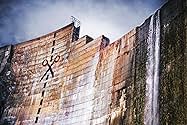This powerful film odyssey across America explores the sea change in our national attitude from pride in big dams as engineering wonders to the growing awareness that our own future is bound... Read allThis powerful film odyssey across America explores the sea change in our national attitude from pride in big dams as engineering wonders to the growing awareness that our own future is bound to the life and health of our rivers.This powerful film odyssey across America explores the sea change in our national attitude from pride in big dams as engineering wonders to the growing awareness that our own future is bound to the life and health of our rivers.
- Directors
- Writers
- Stars
- Awards
- 5 wins total
Edward Abbey
- Self
- (archive footage)
- Directors
- Writers
- All cast & crew
- Production, box office & more at IMDbPro
Featured reviews
Damnation was very well-received in its world premiere at Austin's SXSW Film Festival. The film is a thoughtful, well-supported argument to significantly reduce the thousands of damns in the U.S. This issue has been almost invisible as part of the wider environmental debate and certainly deserves more discussion. I was surprised that this movement has begun to have some success despite being quite low-profile in much of the media. Some parts of the film seemed a little overly idealistic in terms of the argument that preservation of salmon runs and fish species could justify the elimination valuable hydroelectric resources. The overall argument about preserving natural beauty also seemed a little unrealistic in terms of adaptation to modernity. Still the filmmakers made a solid case that some damns had outlived their usefulness. The historical part of the film was very interesting since it is an economic transformation that is rarely discussed. The interviews and the photography were really well-done and they managed to throw in some interesting characters and some humor.
The film had far more depth than the other film about river preservation, Yakona, which also ran at SXSW. While similar politically, the two films were dramatically different in terms of style. Yakona was a wordless meditation without any real substance. . Damnation was well-filmed very informative and detailed and, in the end, makes a rational case rather than emotional one for its point-of-view. I hope the film gets some distribution, because it is an issue that deserves more serious political discussion.
The film had far more depth than the other film about river preservation, Yakona, which also ran at SXSW. While similar politically, the two films were dramatically different in terms of style. Yakona was a wordless meditation without any real substance. . Damnation was well-filmed very informative and detailed and, in the end, makes a rational case rather than emotional one for its point-of-view. I hope the film gets some distribution, because it is an issue that deserves more serious political discussion.
This is a film that will delight folks who think that technology is ruining the world. Its basic premise seems to be that ALL dams are bad. And much of the time this documentary talks about how awful dams are. The film talks about how they kill people when they burst but most importantly they impede salmon from breeding. While there have been a few dam breaks (mostly a long time ago and talking about the Johnstown Flood of 1889 seemed WEIRD and disingenuous since it IS the 21st century) and it's undoubtedly true native salmon populations have been decimated, the film rarely explores the POSITIVES about dams or discusses whether SOME mitigating projects actually work (such as salmon hatcheries in Alaska). While a few folks are shown with contrasting views, mostly they seem like idiots and are overruled by the all-knowing narrator in the movie. The film also doesn't interview the right people--people with informed and scientific facts instead of emotions. I would have loved to have heard from biologists, geologists and the like--but mostly you have Native Americans, park rangers and activists--all people you might want to include ALONG WITH EXPERTS-- not in place of them.
The bottom line is that "DamNation" is clearly a film with a preconceived notion and it does all it can to support it and ignore things to the contrary (such as cheap and clean energy, jobs, increased farm production, etc.). It's a shame in a way, as technically this is a nice looking documentary. The graphics are great and the look of the film is lovely--hence why I give the film a 3 overall. For content, I would only give it a 1.
All of this is very sad, as I am a guy who probably would be towards the middle of this debate. I am an avid fisherman and feel we need to think and re-think many of the dam projects and other projects that negatively impact the environment. But, I think everything should be case by case. Dams are neither always bad or always good- -and anyone wanting to really learn more about this debate would be better advised to read some books instead.
The bottom line is that "DamNation" is clearly a film with a preconceived notion and it does all it can to support it and ignore things to the contrary (such as cheap and clean energy, jobs, increased farm production, etc.). It's a shame in a way, as technically this is a nice looking documentary. The graphics are great and the look of the film is lovely--hence why I give the film a 3 overall. For content, I would only give it a 1.
All of this is very sad, as I am a guy who probably would be towards the middle of this debate. I am an avid fisherman and feel we need to think and re-think many of the dam projects and other projects that negatively impact the environment. But, I think everything should be case by case. Dams are neither always bad or always good- -and anyone wanting to really learn more about this debate would be better advised to read some books instead.
10dhash77
I was really surprised that I enjoyed this documentary so much. The information about our nation's abundance of damns, and the negative environmental impact they have had on the landscape and the indigenous wildlife was shocking to hear and see. Perhaps in the world of environmentalists this is common knowledge, but for a person not entrenched in the cause, like me, it was a compelling argument to learn more about the subject and to get more involved. The cinematography is a highlight of the film, and the information is delivered in a manner that kept me interested the whole time. This is definitely a film worth checking out.
I have heard that dams are not good for environment, and I was expecting to know why human would be better without dams. However the film was way too shallow, tunnel-visioned and very subjective. Science is not a belief. We want to see evidences and know analysis, not just emotional feelings or someone's own reminiscence. There are so much more to talk about of benefits of removing dams on environment, economics and, especially, on human development.The film, focusing narrowly on something that will only affect a very small population and very few aspects of people's life, failed to delivery any powerful or persuasive reasons to audience as to why dams should be removed.
10karenr
DamNation really surprised me - very fascinating, very compelling, and I didn't go in already converted. An excellent film - hats off to Travis Rummel and Ben Knight and also to Yvon Chouinard. The film is a real eye-opener. It avoids didactic, but makes you feel the power and importance of rivers to America. Who knew we have 70,000 dams in the US, most doing nothing useful at this point? I want everyone to see this film - it is really good, really exciting and really important. It is hard to make fish truly sympathetic, they are cold, scaly and expressionless. But this film has me convinced that anything able to swim 900 miles deserve our support, and the removal of a few dams doing nothing useful at this point.
Did you know
Details
- Runtime
- 1h 27m(87 min)
- Color
Contribute to this page
Suggest an edit or add missing content



















